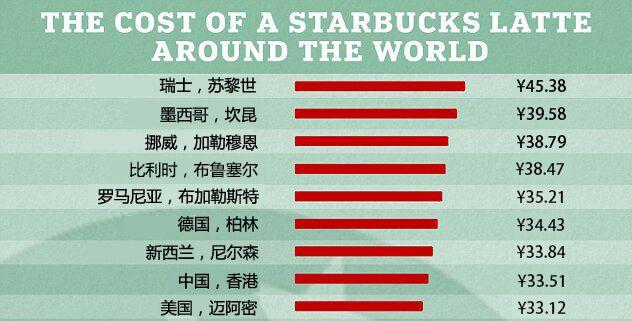Starbucks preferred source of coffee beans
Follow the caf é (Wechat official account vdailycom) and found that Beautiful Cafe opened a small shop of its own.
Where does Starbucks produce coffee beans?
Starbucks coffee is purchased globally, they only purchase beans from high-quality areas around the world, which are then deeply roasted and freshly used. However, Starbucks does not sell exactly the same coffee beans in different countries, with the largest variety in the United States and relatively few in China. At present, Starbucks already has a procurement base in China, but baking has to return to the United States, so the quality has a greater impact.
Shops in China use Yunnan coffee beans, because only Yunnan can produce enough.
Starbucks has few coffee plantations, most of which are purchased in various coffee producing areas around the world, but they have a set of strict purchasing standards, which are called C.A.F.E.
They will sign long-term cooperation agreements for farms that meet their standards to guarantee acquisitions.

The world's first coffee tree was found in the Horn of Africa.
In Greek, coffee stands for "strength and enthusiasm". Humans have been drinking coffee for more than a thousand years. The world's first coffee tree was found in the Horn of Africa, the hometown of coffee in Ethiopia.
Legend: in the mountains of ancient Ethiopia called kaffa, there was a wild shrub bearing small red fruits. A shepherd's goat herd kept making noise after eating the bush fruit. So he took some off curiously and chewed it in his mouth, and after a while he felt refreshed. When a group of monks nearby heard about it and tried to chew with curiosity, they had the same effect. So whenever it was necessary to hold religious ceremonies at night, the monks boiled coffee beans into soup and drank them in this way to keep themselves awake. When coffee was first discovered, the wild shrub had no name. The local people named him after the "Kafa" where he grew up. In the future, the name of "coffee" in the world evolved from "Kafa".
The cultivation of coffee
There are three main coffee growing areas in the world, namely, East Africa and the Arabian Peninsula, Asia and the Pacific Rim, and Latin America. The flavor of caffeine varies from region to region because of its topography, climate, planting methods and processing techniques. Among the common varieties of coffee beans today, there are two of the most commercially valuable coffee: Arabica coffee beans and Roberts coffee beans. Arabica coffee beans, which grow at high altitudes, have a much more refined flavor than other coffee, and the coffee contains only 1% of the total weight of the coffee. Starbucks only buys Arabica coffee with the best quality, and the coffee purchasing team evaluates thousands of coffee samples every year and selects the best quality and taste coffee for purchases. as a result, it has been guaranteed to provide high-quality coffee for coffee lovers for decades.
Ethical purchase of Coffee
Starbucks knows that high-quality coffee is an essential element of business success. Our coffee procurement strategy is to provide economic and social benefits to coffee growers and their communities, and to contribute to environmental protection, that is, ethical procurement.
Starbucks uses an integrated approach to establish a mutually beneficial partnership with the coffee growing community, combining a variety of favorable factors, including paying a premium, helping coffee growers make a profit and supporting their families. Encourage participation in C.A.F.E. The regulations (the Coffee and growers Equity regulations) provide priority procurement policies for growers who meet the best social and environmental standards in the audit report and provisions for increased economic transparency. Procurement of environmental protection (shade planting) and certified coffee (fair trade certification TM and organic certification) to promote environmental protection or improve economic efficiency and other projects. To this end, Starbucks pays much higher coffee prices than coffee commodity prices, enabling coffee growers to get fair prices and profits, while ensuring that they can consistently provide consumers with the highest quality coffee.
About Starbucks Coffee Company
Founded in 1971, Starbucks Coffee has always been committed to business ethics in purchasing and roasting the world's top 3% high-quality Arabica coffee beans. Today, Starbucks with stores all over the world has become the world's leading professional coffee roaster and retailer. Starbucks has always adhered to its commitment to excellent quality and service, following its guiding principles to create a unique Starbucks experience for customers every day through every cup of quality coffee.
Important Notice :
前街咖啡 FrontStreet Coffee has moved to new addredd:
FrontStreet Coffee Address: 315,Donghua East Road,GuangZhou
Tel:020 38364473
- Prev

Which country is Starbucks from?
Starbucks (Starbucks) is the name of an American coffee chain, founded in 1971, is the world's largest coffee chain, its headquarters is located in Seattle, Washington, USA. Is your Starbucks really worth that price? The serious Englishman did collect a price list. As the hometown of Starbucks, the United States is not the most cost-effective place to drink star dads.
- Next

What kind of coffee is Starbucks fw
Following Cafe Review (Wechat official account vdailycom) found that Starbucks fw opened a small shop of its own. Flat White Furebai FW is Flat White, the famous Australian white. It was introduced into China and translated into Ruibai. Australian White is a blend of tiny milk bubbles in one espresso or double Ristretto. To some extent
Related
- Detailed explanation of Jadeite planting Land in Panamanian Jadeite Manor introduction to the grading system of Jadeite competitive bidding, Red bid, Green bid and Rose Summer
- Story of Coffee planting in Brenka region of Costa Rica Stonehenge Manor anaerobic heavy honey treatment of flavor mouth
- What's on the barrel of Blue Mountain Coffee beans?
- Can American coffee also pull flowers? How to use hot American style to pull out a good-looking pattern?
- Can you make a cold extract with coffee beans? What is the right proportion for cold-extracted coffee formula?
- Indonesian PWN Gold Mandrine Coffee Origin Features Flavor How to Chong? Mandolin coffee is American.
- A brief introduction to the flavor characteristics of Brazilian yellow bourbon coffee beans
- What is the effect of different water quality on the flavor of cold-extracted coffee? What kind of water is best for brewing coffee?
- Why do you think of Rose Summer whenever you mention Panamanian coffee?
- Introduction to the characteristics of authentic blue mountain coffee bean producing areas? What is the CIB Coffee Authority in Jamaica?

